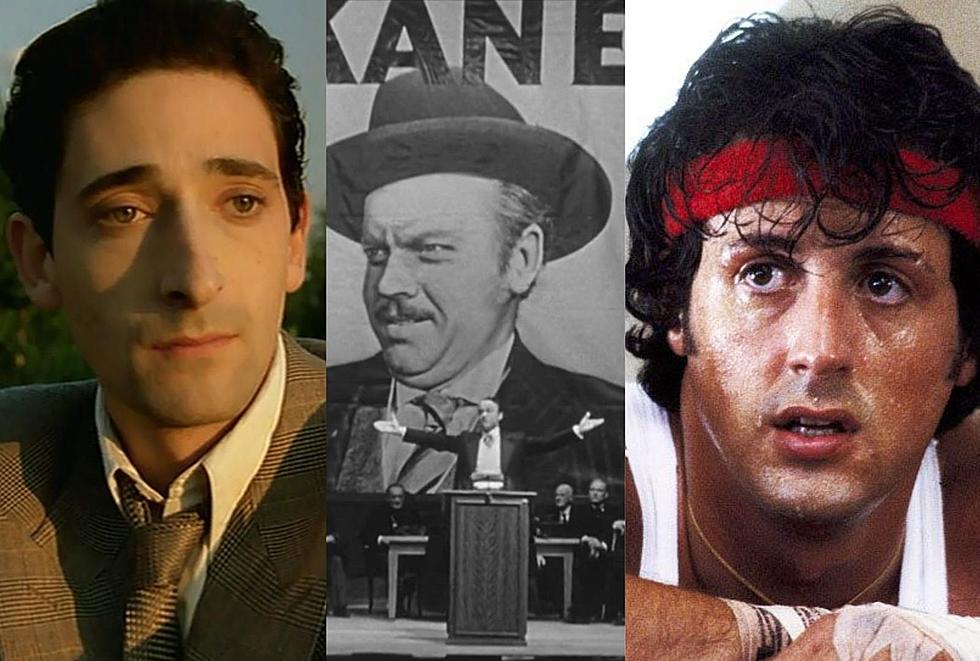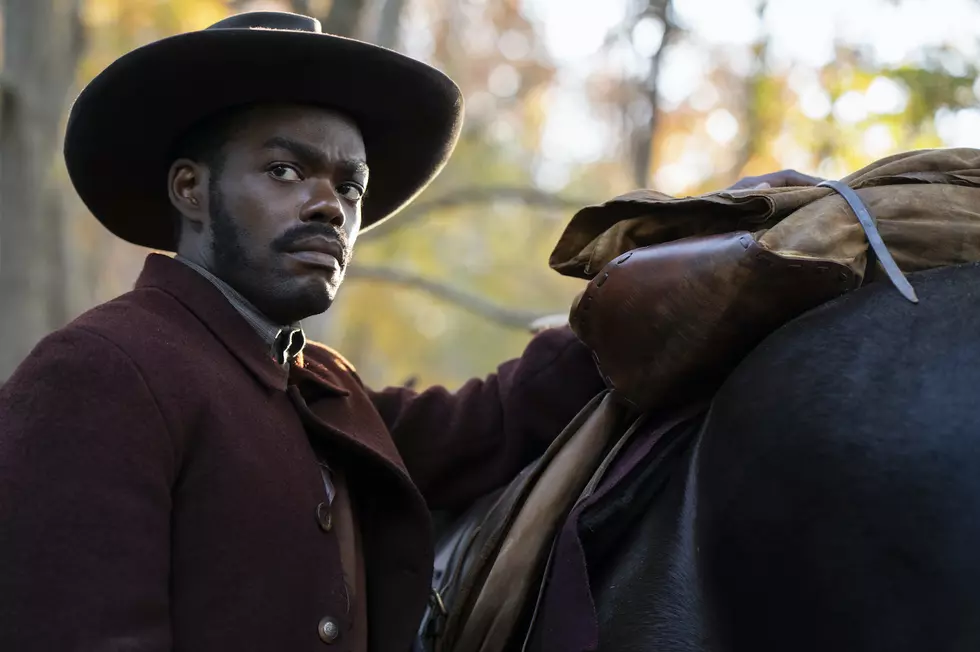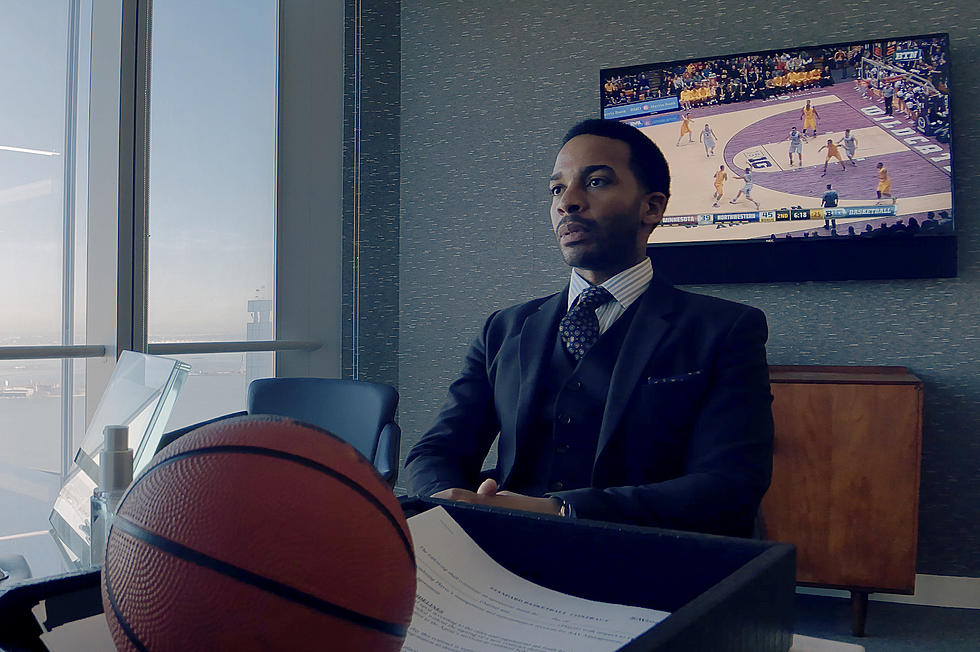
Trevante Rhodes and Andre Holland on the Sublime ‘Moonlight’ and Telling a Nuanced Love Story
Barry Jenkins‘ Moonlight is already being called one of the best movies of the year, and not without reason. It’s both a visual feast quaking with beauty and sadness and a hushed poem about pain and romance. But most people who see Moonlight will focus on its actors, and its two trios of magnetic performances.
Based on Tarrell McCraney’s play In Moonlight Black Boys Look Blue, the film follows a young man named Chiron over the course of three loosely woven chapters. We first meet him as a lanky 9-year-old with intense eyes, played by Alex Hibbert. In the second chapter, Ashton Saunders brings a tense ferocity to Chiron as a bullied teen, and in the last segment Trevante Rhodes embodies Chiron as a brawny adult. As much as Moonlight charts one boy’s search for identity, it’s also a love story. (Minor spoiler alert.) Chiron’s closest childhood friend Kevin (played by Jaden Piner, then by Jharrel Jerome) also becomes the person he shares his first sexual encounter with. In the film’s final chapter, Rhodes’ Chiron and Andre Holland’s Kevin share a quiet, intimate reunion at a Florida diner.
I caught up with Rhodes and Holland in New York to talk about the film, the lack of narratives about queer men of color, and telling a love story full of nuance.
The third chapter of the film is the most evocative and emotional of all three. How did you two craft the adult versions of Chiron and Kevin after they’re played by two other sets of actors?
Andre Holland: I think we both wanted to have time with the younger versions of ourselves, but Barry didn’t want us to. He actually forbade it. So we really didn’t have any contact with them.
Did he explain why?
Holland: He didn’t really tell us why before, but afterwards [and] since we’ve been doing these interviews he said he didn’t want us to be mimicking each other or playing the part to be surface in any way. So he wanted us to really get down to the essence of who these people are, which involved a lot of trust on our parts. I thought well yeah, but isn’t it important that we move the same –
Trevante Rhodes: At least have the same walk.
Holland: I think when you see it, it does feel seamless, as is Barry Jenkins’ brilliance.
Rhodes: It’s a magic trick to have that cohesiveness. It’s just insane that that happened, someone who you have no idea who they are. Especially for me particularly, I really wanted to know Alex [Hibbert], the youngest version, I really wanted to know how he walked. Just the smallest things because I feel in that middle section, there could have been things that didn’t need to lead to the later section. You don’t forget things that you do when you’re younger. Those things are just ingrained into who you are and the middle section can be putting on whatever, but certain things that you do when you’re younger you do as an adult. But yeah, he forbade it.
Holland: Also the shifts between the chapters, they’re almost like new people. They change so much. Especially [Kevin’s] point-of-view from story two to story three. He goes from being this kid who has this idea of what masculinity is and he’s going doing his best to perform his version of, I get the ladies, I’m charming, I say what I want to say and I’m the cool guy. And at some point between story two and three, he’s totally changed. He’s become a father and he’s working a job that I don’t think his younger self imagined he’d be working. And he’s come to some different realization about his own sexuality and about the events of the past. So much so that he has the courage to pick up the phone and call this person who he hadn’t seen in many years, and who he obviously caused a great deal of pain. I feel like that shift between, story two and story three, is seismic.
Those big gaps between the chapters leave so much open to interpretation. Did you two talk with Barry much about what’s happening for your characters during those gaps, or did you draw your own conclusions?
Rhodes: When I got the role I called Barry to speak about that and talk about characteristics. He just said no, “I’m washing my hands with him. He’s yours. Fill that in for yourself and everything that you want and anything that you feel necessary for the person, apply it.” It was really freeing that he let us come to those decisions.
Holland: Same. I had big questions about it as well, but I filled in those gaps for myself.
You only have about three scenes together, but they’re so potent and emotional, especially due to the silence and stillness between your characters. What was it like to not have much dialogue and to sink into those silent moments together?
Rhodes: To listen. For me, I say this so much, but I really appreciate the person that [Holland] is. I really aspire to be as solid of an actor as he is. And Chiron, I guess in my mind, looks to Kevin as someone who has it figured out. So it was really about listening, Chiron listening to Kevin, as well as me listening to Andre, and learning how to be this wonderful actor that I see. It was really about listening. And obviously those moments of silence are him receiving what Kevin has, what Kevin is giving him. Kevin is a big person, a confident person, genuinely. For Chiron to see that, to really like – man, I aspire to be that. I want to be that. It was looking at those moments and listening.
Holland: I did the most talking probably. [Laughs] But I think listening is really what it was about. It’s a tricky thing because Kevin isn’t a guy who – you don’t really know what he’s gonna do necessarily. He doesn’t say, “Hey, I’m here to try and get back together,” or “I’m trying to apologize about what happened before,” – you can’t quite tie down what he’s there to do, which makes it, as an actor, very difficult to play.
In my opinion, you have to listen and be open to people, but also take each and every action that he does as the thing he’s there to do. In other words, [Kevin] gives [Chiron] wine to drink. In that moment that’s what the scene is about. It’s about him giving him a glass of wine to drink. Then the scene becomes about waiting to see if he’s gonna drink that wine. Then, how does that wine affect him? Was that a successful thing? Is he closer to me now than he was before I gave him the wine or further away? You stack all those things together and it becomes this dance between alright, where are we? Until the end when they kind of find each other. I think the end, it really is the beginning for them. They go through all that just to get to a starting place. I think that’s the cost. That’s what, to me, this movie is about.
Do you have your own interpretations of what the ending means?
Rhodes: The ending or what’s going to come of it?
Both.
Rhodes: I have no idea what Kevin is thinking, but I think in Chiron’s mind – I look at love specifically on a scale of one to ten and I feel that most people will settle for a six or a seven. That’s why we have divorce. But I feel like Chiron has found his ten in Kevin. That’s why he was the only person ever, and that’s the most beautiful thing in the world to me. But I feel that if there wasn’t this result that happened to where they were together for the rest of life, I feel like Chiron would never give up on attempting to make that happen. I don’t know if I answered your question, but I think if that didn’t happen, Chiron would be a miserable person for the rest of his life.
If the phone call hadn’t happened?
Rhodes: Well no, if after the film they don’t come together and that doesn’t happen, he will be a miserable person. And yeah, if the phone call didn’t happen he would definitely be this person that would probably die in five years because he’s living this horrendous life. That phone call specifically, obviously, was the change. That not just changed his outlook on life, but permanently changed his life in regards to him being this terrible person doing these terrible things to hopefully now being this person who obviously can accept himself and can live this life of the person that he was when he was that 5 or 6-year-old kid that had all these wonderful aspirations and he was this happy person.
Holland: I just feel so passionately that these are characters that started, both of them, with the deck stacked against them in a major way. They’re black, they’re poor, they’re from the South. As we understand, they aren’t people that have these families that express love to them or encourage them in any way. It’s stacked against them. Chiron goes from where we see him at the beginning to the place at the end of the movie, where he’s just at the beginning, he’s just at the starting point of what his life could be. He knows there’s at least one other person in the world that cares about him, and believes it and will support him. I feel like that is everything to me. I think it’s so easy sometimes, we see people who are vulnerable and we go “Well, they ended up like that, it must be their fault.” Or we can dismiss them or put them to the side because we just assume that they had all the opportunities in life that we had. But these are two people who didn’t have those opportunities and yet they’ve managed to find their way to the beginning. I think that is a hero’s journey.
That return to the beginning is especially true of the film’s final shot with Alex Hibbert. What was your experience watching the film when you finally got to see the younger actors playing your characters?
Rhodes: For me it was surreal, because I honestly feel that physically I looked like Alex when I was younger, so it was insane to see that happen. Then the fact that we’re not in it until the last chapter you can really remove yourself from the film and at least think “I’m just watching a movie that’s great.” And then to see Ashton [Sanders], because I had that awkward gangly phase before filled out a little bit myself, so it was really interesting to really see memories of my life, in a sense, come to fruition in this film. It was insane.
Holland: I loved also seeing how talented those kids are. Getting a chance to see these guys, they’re so talented and so young. I just think “Wow, their careers, they have the potential to have some really special careers, all of them.” I hope that they have everything.
Trevante, you play two sides of Chiron in a sense. When we first see you, Chiron is a tough drug dealer and then Kevin’s phone call is the moment of change when a softness comes out. What was it like to play both of those sides that Chiron is battling with throughout the final chapter?
Rhodes: It’s funny, I look at it specifically at the beginning in those scenes with Stephon [Bron]. With [Bron’s Travis], he’s being the gangster. I felt as if, and it sounds really weird, but I felt as if I was acting as I was acting. I felt like I was putting him on and then obviously when we got to the scenes later on with Andre, I felt as if I was really being this person. It sounds so hoity-toity, but I really did feel that. So it was unique for me to feel that because Chiron was acting.
There’s such a floating and fluid atmosphere to this movie. What was Barry’s process directing you? Was he very involved?
Holland: Barry is very, very hands on. By that I mean he knows what he wants. he knows what he’s after. But at the same time he gives us the freedom to find them. He would set the scene, give us what we needed – “I think this happens over here, I think you might be sitting there and he might be sitting there. Let’s just see what happens.” Then we start playing, he kinda gently shapes it towards what he had in mind. But at the same time he is remarkably open. A lot of times with directors, you get on set and they have such a fixed idea about what they want to do that the best version you’re going to end up with is their own idea of what it was. But he’s a true collaborator. He invites everybody in, listens to everybody’s ideas. What we come to, it was really created together.
Rhodes: He has no definite idea on what anything is. He said there was no right take or right way to do something. It’s more about being in the striking zone. So as long as you were in that striking zone, which we pretty much always were, it was working. We had something to pick from.
There’s a major lack of movies about queer men of color. And beyond this film helping to change that, what’s most beautiful is how it depicts such nuanced sexuality. What was it like to play that romance with such nuance?
Holland: Yeah, nuance is a great word for it. I think like any relationship, it’s nuanced. Tarrell McCraney wrote the play that the movie is based on, he’s one of my closest friends. I’ve learned so much from him and I think most of all I’ve learned that it is – queer relationships, a homosexual relationship, a black homosexual relationship, they’re just relationships. They go through the same things that everybody else goes through. So I think just not coming into it with any kind of stigma, or any kind of received idea about what this relationship should look like or might sound like or feel like, is really all you gotta do. Beyond that, you just listen to the person who you’re in love with and find them to be the most interesting person in this world, which is what everybody does when they fall in love.
Rhodes: I always found the question of – I get asked a lot, how is it pretending to love a man? I found that question to be the most ignorant thing in the world because I feel like that’s kind of disrespectful. You’re born loving men, or loving women. I was born loving women, but I could have just as easily been born loving men and it would have been the same thing. I would have been the same exact person, behaving the same exact way. I feel like that’s the weirdest thing for people to latch onto that being what’s so unique about what we’re doing. Love is love.
I’m hesitant to even call the film a queer romance because unlike so many movies it just shows its characters as people.
Holland: It’s just a romance.
Rhodes: It’s a love story.
Holland: It’s funny, when we were getting ready to do it, my friend Tarrell introduced me to Paris is Burning a long time ago. I remember watching it years ago and thinking “Man, this is so extraordinary.” To see how these people have created these worlds where they can exist fully. In some ways I feel like that’s what these guys do towards the end of the film. They start the process of, “Alright, where can we be what we want to be?” In this movie it just happens across a table, across a diner table.
Andre, had you read Tarrell’s play before you joined the film?
Holland: Yeah. I read the play and I think I’ve been in all of Tarrell’s plays over the course of the last ten years. So I feel like I have a real understanding of who these people are. In fact I feel like I’ve met a lot of the characters in Tarrell’s real life.
But the play isn’t published, right? I couldn’t find it online.
Holland: It’s not published yet. He wrote it when he was a student at Yale. I was at NYU at the time in grad school so we were introduced to each other through a mutual friend. This was ten years ago, he said, “I think this would be a good movie. What do you think?” I was like, “Nah man that ain’t no movie.” [Laughs]
Moonlight is now playing in limited release.
More From ScreenCrush









